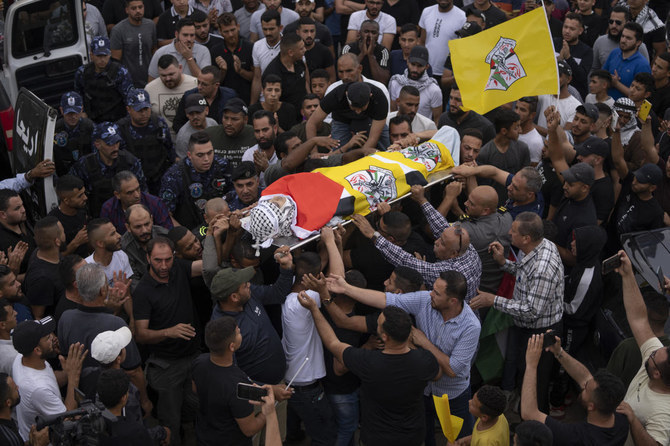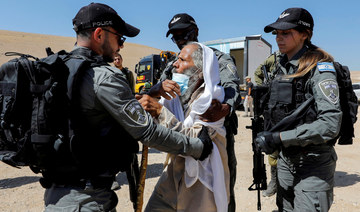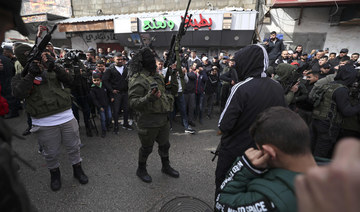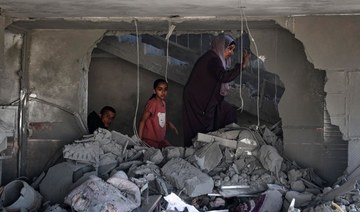JERICHO, Palestinian Territories: A Palestinian was killed Tuesday when Israeli forces stormed a refugee camp in the occupied West Bank in what the army called a “counter-terrorism” operation that sparked violent riots.
The deadly shooting was the latest in a wave of bloodshed in the West Bank and Israel as the Muslim holy month of Ramadan and the Jewish holiday of Passover overlapped this month.
The Palestinian health ministry said 20-year-old Ahmed Ibrahim Oweidat “succumbed to critical wounds sustained by live bullets to the head, at dawn today in Aqabat Jaber camp” near Jericho.
Two other men were wounded by live fire when the “undercover” forces raided the camp overnight, the official Palestinian news agency Wafa said.
Israel’s army said in a statement to AFP that soldiers had conducted an overnight operation in Aqabat “to apprehend wanted suspects.”
“During the operational activity, dozens of Palestinians violently rioted and attacked the soldiers,” it said, adding that no Israeli troops were hurt.
“The rioters burned tires and hurled rocks and Molotov cocktails at the soldiers. The soldiers responded with riot dispersal means and live ammunition.”
Clashes between Israeli forces and Palestinians are common in the West Bank, a territory occupied by Israel since 1967, but recent weeks have seen a surge in unrest.
Attacks by Palestinians and Israeli Arabs in Israel have killed 14 people since late March, while Oweidat is among 25 Palestinians and Israeli Arabs, among them assailants, killed by Israeli forces over the same period.
His body, wrapped in the Palestinian flag and that of the president Mahmud Abbas’s Fatah movement, was driven from a Ramallah hospital to Jericho for his burial, where hundreds of mourners enduring 38 degrees Celsius (100 degrees Fahrenheit) heat surrounded the Oweidat family home. As the body left the family home, Oweidat’s mother wailed as she gave her son a final embrace.
Violent clashes have also recently rocked the compound of the Al-Aqsa mosque in Israeli-annexed east Jerusalem, sparking fears of another armed conflict after an 11-day war last year between Israel and armed groups in the Gaza Strip, triggered by similar unrest.
Following the Al-Aqsa clashes, isolated rocket fire toward Israel from Gaza resumed, prompting Israeli reprisals on targets linked to Hamas, the Islamist group which controls the coastal Palestinian enclave. No injuries have been reported on either side as a result of the rocket fire or retaliatory air strikes.
Israel on Saturday had closed the Erez crossing with Gaza in retaliation for the rocket fire, blocking the 12,000 Palestinians with permits to enter the Jewish state from going to work.
But Erez re-opened Monday “following a security assessment,” Israel’s defense ministry said, warning that a sustained opening was conditioned on “the continued preservation of a stable security situation.”
No rockets have been fired from Gaza since Saturday morning.
Concerns of fresh Al-Aqsa clashes are building, though, ahead of Friday prayers at the compound, with the end of Ramadan also approaching in early May.
Palestinian Muslims have been angered by an uptick in Jewish visits to the Al-Aqsa compound, Islam’s third-holiest site. It is also Judaism’s holiest place and known to Jews as the Temple Mount.
In an apparent attempt to ease tensions, Foreign Minister Yair Lapid told reporters Sunday that Israel was committed to the “status quo” at Al-Aqsa, meaning an adherence to long-standing convention allowing Jews to visit the compound but not pray there.
Palestinian shot dead in Israeli ‘counter-terror’ West Bank raid
https://arab.news/9zj59
Palestinian shot dead in Israeli ‘counter-terror’ West Bank raid

- The Palestinian health ministry: Ahmed Ibrahim Oweidat ‘succumbed to critical wounds sustained by live bullets to the head, at dawn today in Aqabat Jaber camp’ near Jericho
- Israel’s army said in a statement that soldiers had conducted an overnight operation in Aqabat ‘to apprehend wanted suspects’
Lebanon media says two dead in Israeli strikes on south

BEIRUT: Lebanese official media said Israeli strikes on a car and a motorcycle in the country’s south killed two people Monday, with cross-border clashes intensifying in recent days.
The Iran-backed Hezbollah group, a Hamas ally, has traded near-daily cross-border fire with Israel since the Palestinian militant group’s October 7 attack on southern Israel sparked war in the Gaza Strip.
“An enemy drone strike targeted a motorcycle in Naqura,” a coastal town near the Israeli border, Lebanon’s official National News Agency (NNA) said, later reporting “one person was killed and another wounded.”
In another attack, “an enemy drone targeted a car” near the southern village of Zrariyeh, “killing one person,” the NNA said, also reporting Israeli strikes in the country’s east.
It did not say whether the dead were civilians or fighters.
Hezbollah said it launched “a squadron of explosive-laden drones” at northern Israeli army positions “in response to the assassination carried out by the Israeli enemy this afternoon in the Zrariyeh area.”
Israel has previously targeted Hezbollah fighters as well as allied Palestinian and Lebanese militants in cars and on motorcycles.
The violence came as Iran’s acting foreign minister Ali Bagheri was visiting Lebanon, where he was expected to meet Hezbollah leader Hassan Nasrallah.
Iran supports a number of armed groups in the region including the Shiite Muslim movement Hezbollah and Palestinian factions including Hamas.
Bagheri was on his first foreign trip in the position since a helicopter crash last month killed Iran’s top diplomat Hossein Amir-Abdollahian, along with Iranian president Ebrahim Raisi and other officials.
Also on Monday, the United Nations Special Coordinator for Lebanon Jeanine Hennis-Plasschaert said she discussed with Lebanese Foreign Minister Abdallah Bou Habib the “urgency for the parties to return to the cessation of hostilities.”
On Sunday, Hezbollah said its fighters had bombarded two army positions in the Israeli-annexed Golan Heights after deadly Israeli strikes on south Lebanon, which an official told AFP killed two shepherds.
Nearly eight months of violence have left at least 453 people dead in Lebanon, mostly fighters but including 88 civilians, according to an AFP tally.
On the Israeli side, at least 14 soldiers and 11 civilians have been killed, according to the army.
Iran’s hard-line parliament speaker Mohammad Qalibaf registers as a presidential candidate

- Qalibaf initially became speaker following a string of failed presidential bids and 12 years as the leader of Iran’s capital city
DUBAI: Iran’s hard-line parliament speaker, Mohammad Bagher Qalibaf, registered Monday for country’s June 28 presidential election.
Monday marked the last day of registration for the competition. Other politicians have been rumored as potential candidates in the vote to replace Ebrahim Raisi, who died in a helicopter crash with seven others on May 19.
Qalibaf initially became speaker following a string of failed presidential bids and 12 years as the leader of Iran’s capital city, during which he built onto Tehran’s subway and supported the construction of modern high-rises. He was recently re-elected as speaker.
Many, however, know Qalibaf for his support, as a Revolutionary Guard general, for a violent crackdown on Iranian university students in 1999. He also reportedly ordered live gunfire to be used against Iranian students in 2003 while serving as the country’s police chief.
Egypt’s President Sisi orders PM Madbouly to form new cabinet

DUBAI: Egyptian President Abdel Fattah al-Sisi reappointed on Monday Prime Minister Mostafa Madbouly to form a new government after the latter submitted his cabinet's resignation, following Sisi's reelection for a third term last year, the presidency said in a statement.
Egyptian President Abdel Fattah El-Sisi reappointed Prime Minister Mostafa Madbouly on Monday to form a new government after the latter submitted his cabinet’s resignation, following El-Sisi’s reelection for a third term last year, the presidency said in a statement.
El-Sisi directed the new government to focus on lowering inflation and regulating markets as well as attracting and increasing local and foreign investments, the presidency added.
Targets for new cabinet members would also include preserving the country’s national security in light of regional and international challenges, and counter-terrorism, the statement said.
There was no immediate indication of which ministers would be replaced in the long-awaited reshuffle, or when the new cabinet would be announced.
In a post on X, El-Sisi said: “Today, I assigned Dr. Mostafa Madbouly to form a new government that consists of the necessary expertise and competencies to manage the next phase, in order to achieve the desired development in government performance and confront the challenges facing the state.”
El-Sisi was sworn in for his third term in April after sweeping to victory with 89.6 percent of the vote in an election with no serious challengers last December.
As Egypt tried to manage a chronic foreign exchange shortage and high inflation over the past two years there had been speculation that Madbouly himself could be replaced.
Earlier this year, the economy received some reprieve after a record investment agreement with the United Arab Emirates and international funding deals including an expanded loan program with the IMF.
UN experts urge all countries to recognize Palestinian statehood

- The call came less than a week after Spain, Ireland and Norway officially recognized a Palestinian state
GENEVA: A group of United Nations experts called on Monday for all countries to recognize a Palestinian state to ensure peace in the Middle East.
The call came less than a week after Spain, Ireland and Norway officially recognized a Palestinian state, prompting anger from Israel, which has found itself increasingly isolated after nearly eight months of war in Gaza.
The experts, including the UN Special Rapporteur on the human rights situation in the Palestinian territories, said recognition of a Palestinian state was an important acknowledgement of the rights of the Palestinian people and their struggle toward freedom and independence.
“This is a pre-condition for lasting peace in Palestine and the entire Middle East – beginning with the immediate declaration of a ceasefire in Gaza and no further military incursions into Rafah,” they said.
“A two-state solution remains the only internationally agreed path to peace and security for both Palestine and Israel and a way out of generational cycles of violence and resentment.”
Israel’s Foreign Ministry did not respond immediately to a request for comment.
With their recognition of a Palestinian state, Spain, Ireland and Norway said they sought to accelerate efforts to secure a ceasefire in Israel’s war with Hamas in Gaza.
The three countries say they hope their decision will spur other European Union states to follow suit. Denmark’s parliament later rejected a proposal to recognize a Palestinian state.
Israel has repeatedly condemned moves to recognize a Palestinian state, saying they bolster Hamas, the militant Islamist group that led the deadly Oct. 7 attack on Israel which sparked the Israeli offensive in the Gaza Strip.
The conflict has killed more than 36,000 Palestinians, according to Gaza’s health ministry. Israel says the Oct. 7 attack, the worst in its 75-year history, killed 1,200 people, with more than 250 hostages taken.
Iran’s supreme leader says Israel headed for ‘destruction’

- Since the 1979 Islamic revolution, Iran, the main Shiite Muslim power, has emerged as the bitter enemy of Israel and that country’s Western allies the United States and Britain
TEHRAN: Iran’s supreme leader Ayatollah Ali Khamenei on Monday praised Hamas’s unprecedented October 7 attack against Israel and predicted the “destruction” of their common enemy.
Khamenei, 85, was speaking at an event to mark 35 years since the death of Ayatollah Ruhollah Khomeini, the founder of the Islamic Republic which replaced a US-backed monarchy.
He said the October 7 attack by Palestinian Islamist militant group Hamas “was a decisive blow to the Zionist regime” and put Israel “on the path that will only end in its destruction.”
Since the 1979 Islamic revolution, Iran, the main Shiite Muslim power, has emerged as the bitter enemy of Israel and that country’s Western allies the United States and Britain.
Iran is under international sanctions over its contested nuclear program which it insists is for civilian purposes.
While Israel and Iran have long fought a shadow war of killings and sabotage, Iran’s armed allies across the Middle East have formed a so-called “Axis of Resistance” alliance.
As the Gaza war has raged, Iran and Israel came to the brink of war in mid-April when Tehran launched a barrage of rockets and missiles at Israel, most of which were intercepted.
Iran has said it had no advance knowledged of Hamas’s October 7 attack but has praised it since.
Khamenei said the attack “happened at the right time” and “destroyed a major international conspiracy for the Middle East,” a possible reference to US-led moves to broker diplomatic ties between Israel and Arab powers.
The Gaza war was sparked by Hamas’s October 7 attack, which resulted in the deaths of 1,190 people, mostly civilians, according to an AFP tally based on Israeli official figures.
Militants also took about 250 hostages, 120 of whom remain in Gaza, including 37 the army says are dead.
Israel’s retaliatory bombardments and ground offensive have killed at least 36,439 people in Gaza, mostly civilians, the Hamas-run territory’s health ministry said on Sunday.
Khamenei, who spoke to thousands gathered in the Khomeini mausoleum near Tehran, also said that “the Zionist regime is gradually melting before the eyes of the people of the world.”
“Sooner or later, America will have to withdraw its support,” he added.


















